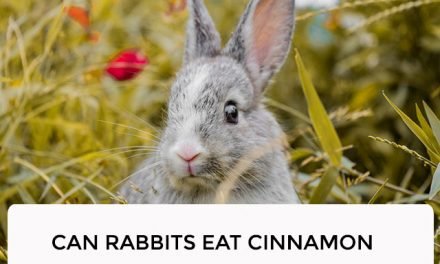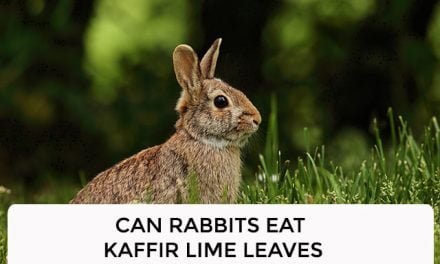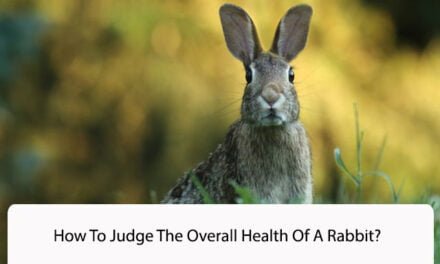Rabbits are herbivores and require a diet that is high in fiber and low in sugar. As such, it is important to be mindful of what we feed them, including vegetables and fruits. Sugar snap peas are a popular vegetable that many people enjoy, but can rabbits eat them?
The short answer is yes, rabbits can eat sugar snap peas. In fact, sugar snap peas are a great source of fiber, vitamins, and minerals that can benefit a rabbit’s overall health. However, it is important to feed sugar snap peas to rabbits in moderation, as too much can cause digestive issues such as gas or diarrhea.
When feeding sugar snap peas to rabbits, it is important to properly wash and prepare them. Remove any dirt or debris and cut them into small pieces to prevent choking. Additionally, it is recommended to introduce new foods slowly and in small quantities to monitor for any adverse reactions. With proper care and moderation, sugar snap peas can be a healthy addition to a rabbit’s diet.
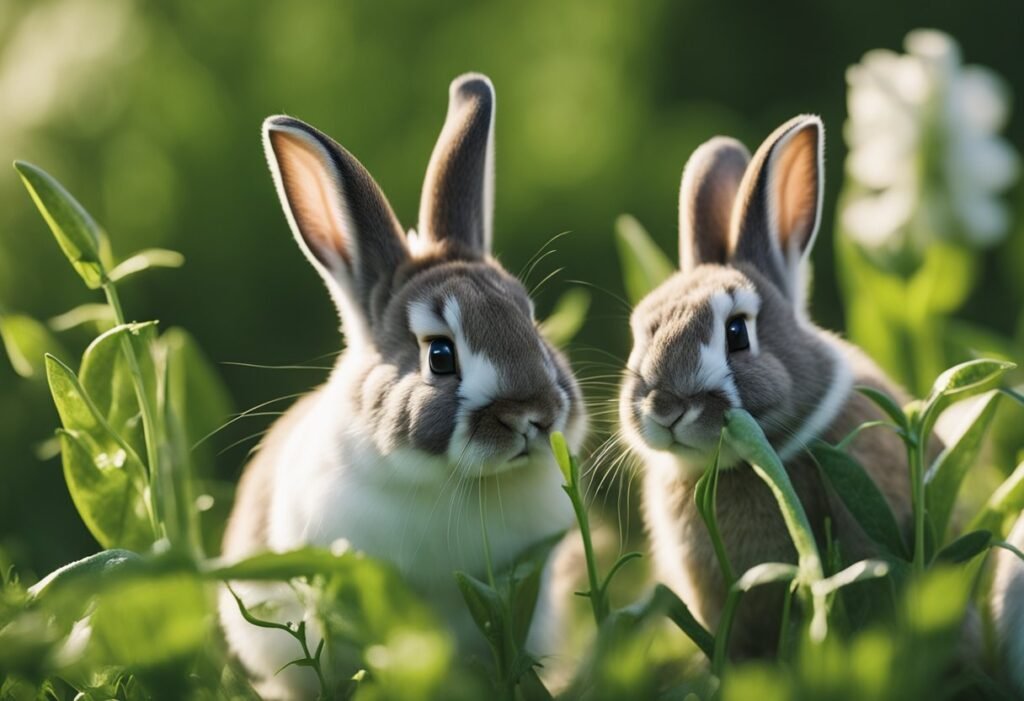
Understanding Rabbit Diet
When it comes to feeding rabbits, it’s essential to understand their dietary needs. Rabbits are herbivores, which means they primarily eat plants. Their diet should consist of hay, fresh vegetables, and limited amounts of fruit.
Hay is the most crucial part of a rabbit’s diet. It provides the necessary fiber for their digestive system and helps maintain healthy teeth. We recommend providing your rabbit with unlimited access to hay, such as Timothy or Orchard grass.
Fresh vegetables are also an essential part of a rabbit’s diet. They provide essential vitamins and minerals, and the fiber helps maintain a healthy digestive system. However, it’s essential to introduce new vegetables slowly and in small amounts to avoid digestive upset. Sugar snap peas are a great option for rabbits because they are low in sugar and high in fiber.
Fruit should only be given as a treat and in limited amounts. Too much fruit can cause digestive upset and lead to obesity. We recommend giving your rabbit small amounts of fruit, such as berries or apples, once or twice a week.
In summary, a rabbit’s diet should consist of unlimited hay, fresh vegetables, and limited amounts of fruit. It’s important to introduce new foods slowly and in small amounts to avoid digestive upset. Sugar snap peas are a great addition to a rabbit’s diet because they are low in sugar and high in fiber.
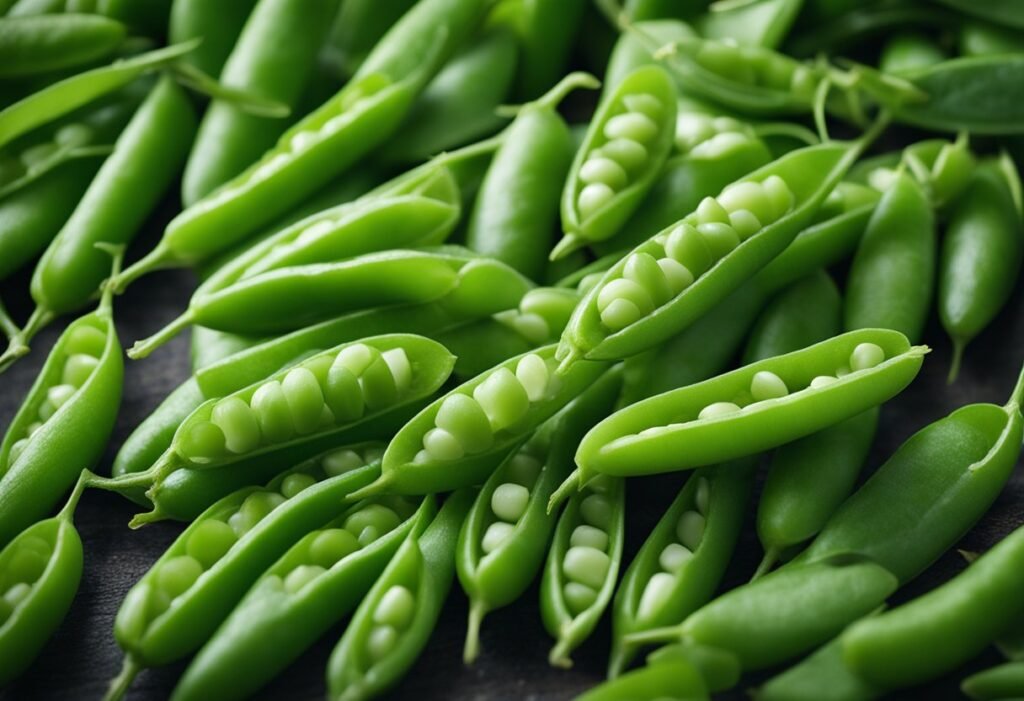
Can Rabbits Eat Sugar Snap Peas
Sugar snap peas are a delicious and crunchy snack that many of us enjoy. But can rabbits eat sugar snap peas? The answer is yes, rabbits can eat sugar snap peas in moderation.
Health Benefits
Sugar snap peas are a good source of vitamins and minerals that are beneficial for rabbits. They contain vitamin C, which is important for maintaining a healthy immune system. They also contain vitamin K, which is important for blood clotting and bone health. In addition, sugar snap peas are a good source of fiber, which can help keep your rabbit’s digestive system healthy.
Potential Risks
While sugar snap peas are generally safe for rabbits to eat, there are some potential risks to be aware of. First, sugar snap peas are high in sugar, which can lead to weight gain and other health problems if your rabbit eats too many. Second, sugar snap peas contain oxalic acid, which can interfere with the absorption of calcium and lead to kidney problems if your rabbit eats too much.
To avoid these potential risks, it’s important to feed your rabbit sugar snap peas in moderation. Offer them as a treat rather than a staple food, and make sure to balance them out with other healthy foods like hay and fresh vegetables. If you notice any signs of digestive upset or other health problems after feeding your rabbit sugar snap peas, stop feeding them and consult with your veterinarian.
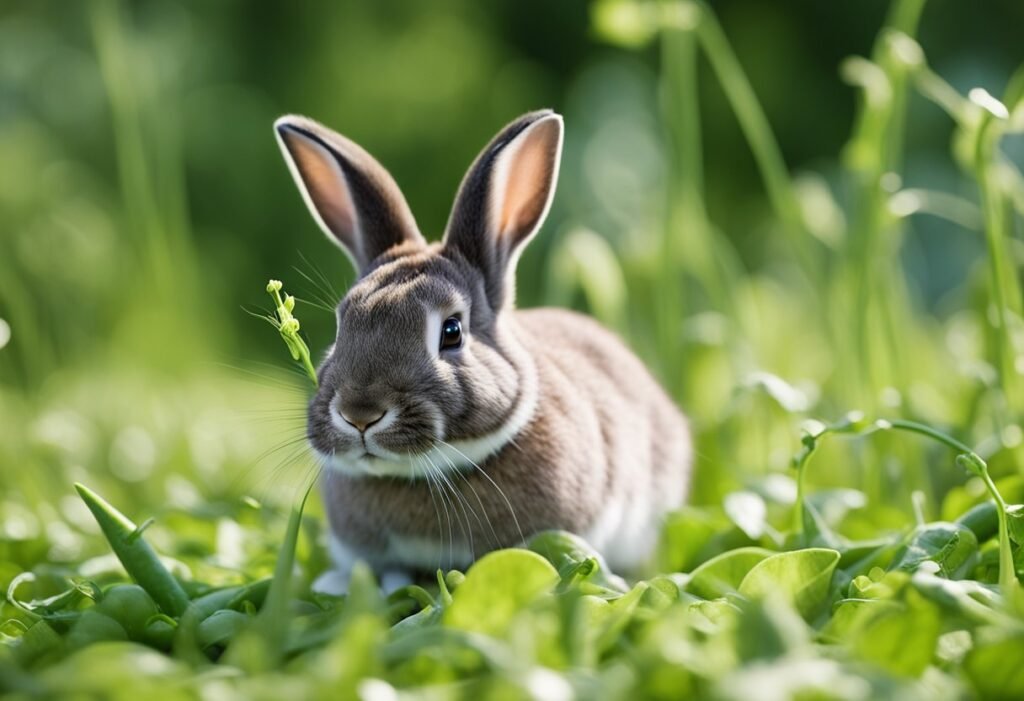
How to Feed Sugar Snap Peas to Rabbits
When feeding sugar snap peas to rabbits, it’s important to keep in mind that they should only be given as an occasional treat and not as a regular part of their diet. While sugar snap peas are safe for rabbits to eat, they are high in sugar and should be given in moderation.
To feed sugar snap peas to rabbits, start by washing them thoroughly to remove any dirt or pesticides. Then, cut them into small pieces that are easy for your rabbit to chew and digest. You can offer the sugar snap peas to your rabbit as a standalone snack or mix them in with their regular food.
It’s important to monitor your rabbit’s intake of sugar snap peas and any other treats to ensure they are not consuming too much sugar or disrupting the balance of their diet. As with any new food, it’s best to introduce sugar snap peas gradually and in small amounts to avoid any digestive upset.
In summary, sugar snap peas can make a tasty and healthy treat for rabbits when given in moderation. Remember to wash them thoroughly, cut them into small pieces, and monitor your rabbit’s intake to ensure they are maintaining a balanced diet.

Alternatives to Sugar Snap Peas for Rabbits
While sugar snap peas can be a tasty treat for rabbits, it’s important to remember that they should only be given in moderation. If you’re looking for alternative vegetables to feed your furry friend, here are a few options:
- Carrots: Carrots are a classic rabbit treat that are high in fiber and Vitamin A. However, they are also high in sugar, so they should be given in small amounts.
- Bell Peppers: Bell peppers are a great source of Vitamin C and come in a variety of colors. They are low in sugar and can be a healthy addition to your rabbit’s diet.
- Broccoli: Broccoli is a nutrient-dense vegetable that is high in fiber and Vitamin C. It should be given in moderation, as too much can cause gas and bloating.
- Kale: Kale is a leafy green that is packed with nutrients, including Vitamin A, Vitamin C, and calcium. It should be given in moderation, as too much can cause bladder stones.
Remember, when introducing new foods to your rabbit’s diet, it’s important to do so slowly and in small amounts to avoid digestive upset. Always consult with your veterinarian before making any major changes to your rabbit’s diet.
Conclusion
In conclusion, sugar snap peas are a safe and healthy snack for rabbits. They are rich in vitamins and minerals that are essential for a rabbit’s health, including vitamin C, vitamin K, and fiber. However, moderation is key when feeding sugar snap peas to your rabbit. Too much can cause digestive problems such as diarrhea and bloating.
It is important to introduce sugar snap peas slowly into your rabbit’s diet and monitor their reaction. It is also recommended to wash the sugar snap peas thoroughly before feeding them to your rabbit to remove any pesticides or harmful chemicals.
In addition to sugar snap peas, there are many other vegetables and fruits that rabbits can eat. It is important to provide a varied diet to ensure your rabbit receives all the necessary nutrients they need to stay healthy.
Overall, when fed in moderation, sugar snap peas can be a tasty and nutritious addition to your rabbit’s diet.

Frequently Asked Questions
Are sugar snap peas safe for rabbits to eat?
Yes, sugar snap peas are safe for rabbits to eat in moderation. They are a good source of fiber, vitamins, and minerals that can help keep your rabbit healthy. However, too much of any vegetable can cause digestive problems, so it’s important to feed sugar snap peas in small amounts.
Which vegetables are safe for rabbits to eat?
Rabbits can safely eat a variety of vegetables, including leafy greens like kale, spinach, and lettuce, as well as other vegetables like carrots, broccoli, and bell peppers. It’s important to introduce new vegetables slowly and in small amounts to avoid digestive problems.
Can rabbits eat snow peas instead of sugar snap peas?
Yes, rabbits can eat snow peas instead of sugar snap peas. Snow peas are a good source of fiber, vitamins, and minerals, just like sugar snap peas. However, it’s important to feed snow peas in moderation, as too much of any vegetable can cause digestive problems.
Can giving rabbits sugar snap peas be harmful?
Feeding rabbits sugar snap peas in moderation is not harmful. However, feeding too many sugar snap peas or any other vegetable can cause digestive problems like diarrhea and bloating. It’s important to feed a balanced diet that includes hay, fresh vegetables, and a small amount of pellets.
What are the benefits of feeding rabbits vegetables?
Feeding rabbits vegetables can provide them with important nutrients like fiber, vitamins, and minerals that are essential to their health. Vegetables can also help keep rabbits hydrated and prevent digestive problems like hairballs.
Are there any vegetables that rabbits should avoid?
Some vegetables like potatoes, rhubarb, and avocado are toxic to rabbits and should be avoided. Other vegetables like cabbage and cauliflower can cause gas and bloating in some rabbits, so it’s important to introduce them slowly and in small amounts. Always research any new vegetable before feeding it to your rabbit.


